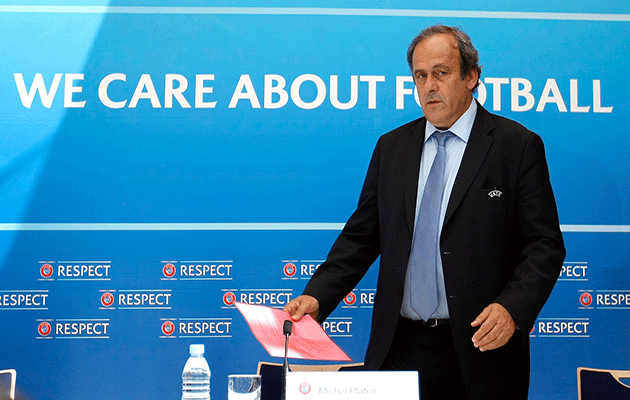Once upon a time there were two giants. One was old and sick, lacking in leadership and direction, while the other was youthful, successful, efficient and purposeful.
Now the roles of world football federation FIFA and its European cousin UEFA have been reversed.
FIFA, whatever its trials (in both cultural and legal senses), has gained a new president and a clear reformist pathway to follow (whether it does so or nay). UEFA, by contast, has an absentee president in legal limbo, no administrative boss and is runs only courtesy of the sleep-walking consistency of its competitions.
This is the backdrop to UEFA’s annual congress which is being staged here in Budapest. Being staged, effectively, in just one afternoon because, without leadership, the organisation’s political and decision-making process is frozen in time.
Michel Platini, UEFA’s French president, has been out of official circulation since October last year when he was first suspended by the FIFA ethics committee over the murky business of the SFr2m ‘disloyal payment’ authorised from FIFA by its own then president Sepp Blatter.
Platini has denied all wrongdoing; insisted the money was due under a verbal agreement from nine years earlier when he was Blatter’s ‘football counsellor’ at FIFA; and is currently contesting a six-year ethics ban (commuted from eight years) at the Court of Arbitration for Sport.
While he has maintained an insistence of innocence the gentlemen of UEFA’s executive committee have deemed it wrong to replace him. Groans of glacial impatience have been detected from the Nordic regions but no-one in Middle Europe, which has benefited the most under Platini, is in any hurry to replace the goose who laid their golden (Champions League) eggs.
In February, on the eve of the FIFA Congress which turned Gianni Infantino from UEFA’s general secretary into the head of world football, UEFA held an extraordinary congress of its own in Zurich. Initially it was thought to be a protective arrangement, in case an election might be needed to set up this week in Budapest; in the event it was largely a non-event.
UEFA is not assisted by the fact that the unofficial caretaker chairmanship has fallen on the Spanish shoulders of senior vice-president Angel Maria Villar whose perception of inspirational communication is to say as little as possible as infrequently as possible.
FIFA’s initial reformer Mark Pieth had suggested earlier this year that now was the time for major federations such as Germany and England to show some backbone. But the DFB has troubles enough of its own and Greg Dyke is preparing to vacate the chairmanship of the Football Association just as soon as he can.
No help there then.
However it is an all wind which blows no-one any good. UEFA’s leadership vacuum has played perfectly into the hands of the elite clubs. They have been busily sabre-rattling with resurrected talk of a superleague and a Champions League revamp to regain all their old command and access and an even larger share of the revenues.
From the point of view of the likes of Real Madrid and Barcelona and Manchester United, the timing could not be better. Later this year UEFA must decide on the settlement for the next three-year organisational and financial deal. The clubs are marching all over the battlefield, largely unchecked.
Of course, by the end of this week or the start of next according to the Court of Arbitration for Sport, Platini could be back in power. But, even with his name cleared, his room for manoeuvre will be limited. In any case, he has already indicated he has no more stomach for a further election fight beyond a current term which ends in 2019.
Unlike Blatter, who envisaged clinging to the FIFA presidency until he was carried out feet-first, there is no reason to doubt Platini’s word. His reputation, even if cleared of ethics breaches, is permanently compromised; he will forever be associated with a senior role during the most poisonous era in the administration of international football.
So this is the context in which UEFA and its national association leaders meet this week. The imminent climax of the Champions League will provide a welcome sporting distraction; but only briefly. Even the prospect of the forthcoming Euro 2016 finals has been marred by fearful concerns over security and terrorism.
UEFA, not only this week but this year, is not in a good place.







